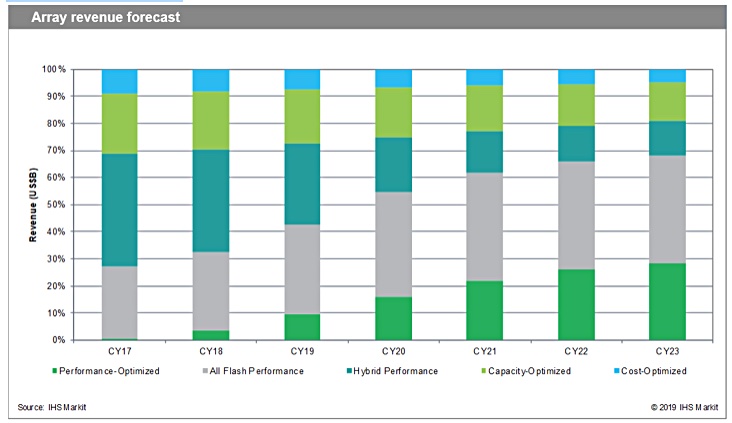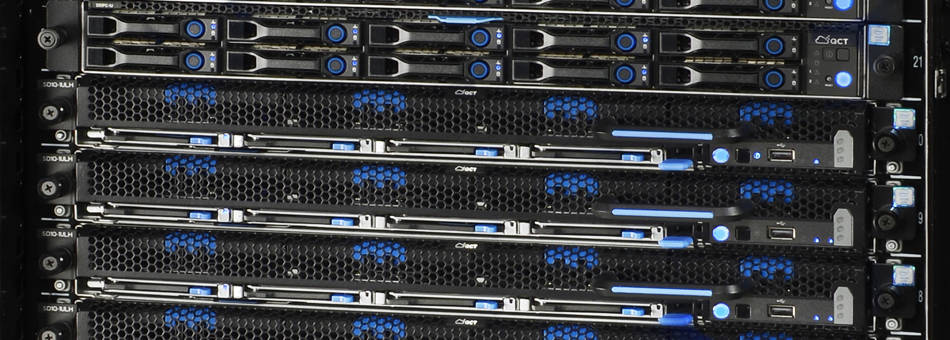We have picked out four themes for you in our Easter enterprise storage roundup: flash arrays are taking over from disk arrays; backup to the cloud is booming, and storage vendors are finding rich pickings in for genomics and video surveillance.
All-flash arrays rule
IHS Market research numbers show that 2018 could be the last year hybrid array shipments are greater than all flash arrays. Hybrid arrays include all-disk and flash+disk arrays.
The IHS Markit forecast for 2019 has all flash performance arrays growing 23 per cent to reach 33 per cent of array revenue share, and hybrid performance arrays declining 15 per cent to 30 per cent.

Year-over-year server external storage revenue, including array and server expansion storage, rose seven per cent to $9.8bn in the fourth 2018 quarter, according to the IHS Market’s “Data Center Storage Equipment Market Tracker” . The hybrid array category led the array market at $3.5bn, with a year over year decline of 6 per cent. The overall flash array category grew 40 per cent annually to reach $3.2 billion.
The IHS people said:
- The Total server external data centre storage market will reach $63bn by 2023, up from $30bn in 2018, for a five-year compound annual growth rate of 11 per cent.
- Capacity-optimised (i.e., spinning disk) arrays declined 4 per cent, year over year, in 2018, as purchasing shifts to flash.
- Enterprises accounted for 44 per cent of storage equipment revenue in the fourth quarter, followed by cloud service providers with 41 per cent and telcos at 14 per cent.
Cloud backup market
Verified Market Research has published the “Cloud Backup Market Size and Forecast to 2025” report and predicts that the cloud backup market will reach $10.25bn by 2025, up from $1.65bn in 2016. This equates to 25.9 per cent compound annual growth rate from 2017 to 2025.
The report says storing backups in the cloud is cheaper than on-premises. Thirteen vendors are listed as the main suppliers in this area: Acronis, Asigra, Barracuda, CA, Carbonite, Datto, Druva, Efolder, IBM, Iron Mountain, Microsoft, Symantec and Veeam.
Cloudian issues news in threes
Object storage software supplier Cloudian has announced availability of a Cisco Validated Design for its HyperStore software on Cisco UCS servers. The two say it’s designed for cloud infrastructures, with S3 compatibility enabling data management across public and private cloud environments.
Secondly, Cloudian announced a collaboration with Telestream to deliver media-aware storage and content processing of video and audio files. It combines Telestream Vantage with Cloudian’s HyperStore for the search and analysis of media files by using automated enriched metadata tagging.
Vantage processes and analyses media files, providing services such as auto-transcription and captioning, keyword analysis, ingest workflow and asset QC automation, and active library management functions. It automatically creates enriched metadata, a media overlay, that is stored with the associated content in HyperStore.
That means customers can search, discover and analyse media files and develop programmatic metadata-driven workflow automation within the HyperStore environment.
Thirdly, Cloudian’s HyperStore has been certified for use with Veritas Enterprise Vault as a vault store. It claims customers can reduce archive costs by up to 70 per cent compared to NAS and tape-based systems. Cloudian suggests it can be used to replace EMC Centera systems.
There’s more information available here.
Exagrid exerts itself for Zerto
Exagrid, with its deduping to disk array backup target, and Zerto with continuous data protection disaster recovery software, have a combined backup/disaster recovery offering.
Zerto on-premises software produces a stream of backup data which goes to an on-premises Exagrid array with data changes constantly recorded to the Zerto Elastic Journal so that recovery points are kept up to date.
Zerto writes long-term daily, weekly, monthly, and yearly backups directly to ExaGrid’s so-called landing zone, with no deduplication, for fast restores of recently added backups. In parallel with this backup, but not inline, ExaGrid deduplicates the data into the ExaGrid repository for long-term retention. As data grows, appliances are added to the ExaGrid system in a scale-out fashion.
ExaGrid and Zerto can replicate data in the onsite ExaGrid system to an offsite location, public cloud, or a secondary physical ExaGrid system to ensure that long-term retention data is protected from site disaster.
Qumulo goes to Genetech
Scale out filesystem supplier Qumulo has had its software certified with Genetec Security Center. Genetec provides IP-based video surveillance, access control, automatic license plate recognition (ALPR), communications, and analytics.
Basically Genetech data is stored as files in a Qumulo filer.
The video surveillance market was valued at $6.89bn in 2018 and is expected to reach $68.34bn by 2023, at a CAGR of 13.1 per cent. That’s massive growth and all those videocam files will need storing somewhere.
It’s no surprise storage media and filesystem suppliers, such as Western Digital, Pivot3 and Qumulo, are piling in to get a piece of the action.
Veeam’s fast growth continues
Backup and now cloud data protection software supplier Veeam reported a 16 per cent increase in total bookings year-over-year (YoY) in its first 2019 quarter. It now has more than 343,000 customers, consistently gaining an average of 4,000 new customers each month. The privately-held company does not publish revenue or profit or loss statements.
Veeam is looking cloudwards to continue its growth and, hopefully, attain the longed for billion dollar a year revenue target. According to IDC cloud-based data protection as a service is growing at a 16.2 per cent CAGR – ” much faster than the 3.4 per cent CAGR for traditional data protection and recovery software.” That should help Veeam.
- Annual Recurring Revenue increased 30 per cent YoY,
- Veeam Availability Suite 9.5 update 4, released at the beginning of Q1, it has had more than 200,000 downloads to date
- Veeam Backup for Microsoft Office 365 is the fastest growing product in Veeam history, with 152 per cent revenue bookings growth YoY
- Veeam reported 31 per cent YoY growth in its overall cloud business for Q1’2019
WekaIO, Western Digital and genomics data storage
WekaIO’s Matrix file system is storing files on Western Digital’s ActiveScale array in a genomics data demo. The two suppliers, along with Sentieon and PetaGene, are showing an optimised genomics data analysis workflow at Bio-IT World in Boston this week.

Sentieon produces tools for genomic data analysis, while PetaGene provides genomics data compression systems which use Sentieon tech. The ActiveScale array supplies integrated data tiering and remote backup to the cloud.
PetaGEne’s compression can deliver up to 90 per cent reduction of BAM and FASTQ.gz file sizes, without any loss of information, resulting in more than 50 per cent net savings in overall storage costs. The compression also lowers data transfer time
The suppliers say their combined system offers good storage performance and capacity scaling for genome sequencing workloads.
David Hiatt, director of business development at WekaIO, bigs up the size of the task at hand: “Genomic workloads are among the most challenging for storage systems with billions of small files and intense metadata operations. … an integrated solution reduces total storage costs and dramatically improves data accessibility.”
Shorts
In-memory compute supplier Hazelcast has announced general availability of Hazelcast Jet, claimed to be the industry’s fastest stream processing engine that rivals Apache Spark. Capable of ingesting, categorizing and processing vast amounts of data with ultra-low latency, Hazelcast Jet provides a real-time data processing system that simplifies deployment, and is specifically designed for environments such as IoT, edge and cloud.
Backup vendor HYCU has announced a distribution agreement with Tech Data ANZ to expand its footprint across Australia and New Zealand for the HYCU for Nutanix business.
VAST has support for NFS over RDMA. It’s designed specifically for the AI use cases and, in effect, enables kernel bypass. In this respect it’s similar to Quobyte with its TensorFlow plug-in.








